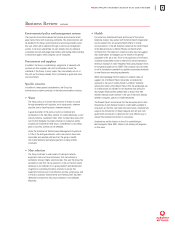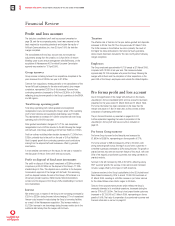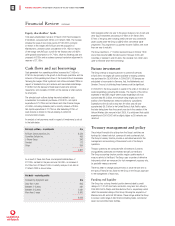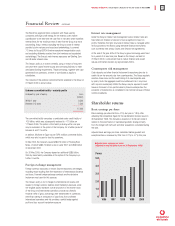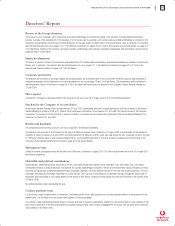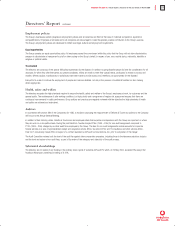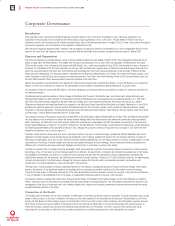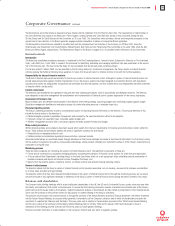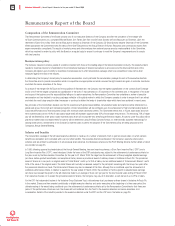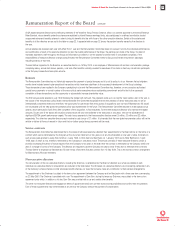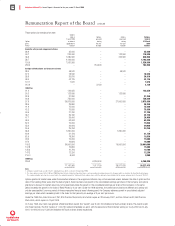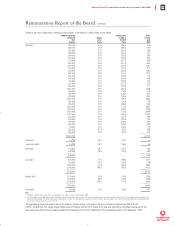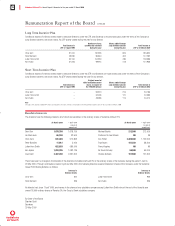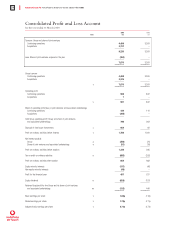Vodafone 2000 Annual Report Download - page 20
Download and view the complete annual report
Please find page 20 of the 2000 Vodafone annual report below. You can navigate through the pages in the report by either clicking on the pages listed below, or by using the keyword search tool below to find specific information within the annual report.
Vodafone AirTouch Plc Annual Report & Accounts for the year ended 31 March 2000
18
Introduction
The Combined Code on Corporate Governance requires companies listed on the London Stock Exchange to make a disclosure statement on its
application of the principles of and compliance with the provisions of good governance set out in the Code. The year ended 31 March 2000 was a
momentous year for the Company and the matters described below, and in the Remuneration Report on pages 20 to 26, relate to the position throughout
the year and, generally, prior to completion of the acquisition of Mannesmann AG.
With the minor exceptions explained below, relating to the the question of training for directors and the election of a senior independent director for the
period to 30 June 1999, the Company has been in compliance with the Combined Code provisions throughout the year ended 31 March 2000.
Directors and Organisation
The Company presently has sixteen directors, seven of whom served throughout the year ended 31 March 2000. Their biographical details are set out
briefly on page 28 of the Annual Review. The merger with AirTouch Communications, Inc. in June 1999, the acquisition of Mannesmann AG in April
2000 and the creation of the Company’s joint venture with Bell Atlantic Corp., which was completed in April 2000, have resulted in a year of change for
the Board. On completion of the AirTouch transaction on 30 June 1999, Ian MacLaurin stepped down as Chairman and became Deputy Chairman and
senior non-executive director with Sam Ginn, the Chairman and Chief Executive of AirTouch, becoming Chairman of the Company. Professor Sir Alec
Broers and John Gildersleeve, non-executive directors, resigned from the Board and Michael Boskin, Don Fisher, Paul Hazen and Charles Schwab, all of
whom had served on the AirTouch board, joined as non-executive directors. Arun Sarin, then Chief Operating Officer of AirTouch and Mohan Gyani, the
AirTouch Chief Financial Officer, were appointed to executive positions at the same time.
Mohan Gyani decided to leave the Board on 30 September 1999 and the Company then invited Sir Alec Broers to re-join the Board as a non-executive
director. Sir Alec was re-elected as a director by the shareholders at the Company’s Extraordinary General Meeting on 24 January 2000.
On completion of the joint venture with Bell Atlantic, Arun Sarin resigned as an executive director but accepted an invitation to remain on the Board in a
non-executive capacity.
The Mannesmann acquisition resulted in further changes to the Board after the end of the financial year. Josef Ackermann, Jürgen Schrempp and
Henning Schulte-Noelle, all then members of the Supervisory Board of Mannesmann AG, were appointed as non-executive directors on 1 May 2000.
Sam Ginn and Charles Schwab resigned on 23 May 2000 and Ian MacLaurin was re-appointed Chairman. Paul Hazen was elected as a Deputy
Chairman and the senior non-executive director in succession to Ian MacLaurin. Klaus Esser will join the Board as a Deputy Chairman on 5 June 2000,
the date upon which he steps down from his position with Mannesmann AG. The Company considers all its present non-executive directors, except
Arun Sarin, to be fully independent. The five executive directors are Chris Gent (the Chief Executive), Peter Bamford, Thomas Geitner, Julian Horn-Smith
and Ken Hydon. Thomas Geitner joined the Board on 15 May 2000.
The Company’s Articles of Association, approved by shareholders at the Extraordinary General Meeting held on 24 May 1999, provide that every director
who was elected or last re-elected at or before the Annual General Meeting held in the third calendar year before the current year shall automatically
retire. Accordingly, Ian MacLaurin, Chris Gent and Ken Hydon will be retiring and, being eligible, will offer themselves for re-election at the Company’s
Annual General Meeting to be held on 27 July 2000. Furthermore, five new directors, Thomas Geitner, Josef Ackermann, Klaus Esser, Jürgen Schrempp
and Henning Schulte-Noelle, will be proposed for election. Also, although the Company’s Articles of Association do not require it, Don Fisher will offer
himself for re-election as he is over the age of 70.
The Board, which meets six times each year and on one other occasion in the year to consider strategy, provides the effective leadership and control
required for a listed company. Actual financial results are presented to each meeting, together with reports from the executive directors in respect of
their areas of responsibility. From time to time, the Board receives detailed presentations from non-Board members on matters of significance or on new
opportunities for the Group. Financial budgets and forecasts are regularly discussed at Board meetings. The non-executive directors periodically visit
different parts of the Group and are provided with briefings and information to assist them to perform their duties.
The Board is confident that its members have the knowledge, talent and experience to perform the functions required of a director of a listed company.
Accordingly, it has not introduced a formal training programme for directors. On appointment, all directors are provided with guidance as to their duties,
responsibilities and liabilities as a director of a public and listed company and also have the opportunity to discuss organisational, operational and
administrative matters with the Chairman, the Chief Executive and the Company Secretary. Provision A.1.6 of the Combined Code has, for these reasons,
not been complied with in its strictest sense, although the Company believes that the information and assistance provided to all directors upon
appointment is more than adequate to comply with the spirit of the provision.
The Board has a formal schedule of matters specifically reserved to it for decision, including the approval of Group commercial strategy, major capital
projects, the adoption of any significant change in accounting policies or practices and material contracts not in the ordinary course of business.
The directors have access to the advice and services of the Company Secretary and have resolved to ensure the provision, to any director who believes
it may be required in the furtherance of his or her duties, of independent professional advice at the cost of the Company.
The executive directors, together with certain other Group functional heads, the President of the US/Asia Region and the Chief Executive of Vodafone
Pacific, meet each month as the Executive Committee under the chairmanship of the Chief Executive. This Committee is responsible for the day-to-day
management of the Group’s businesses and it also reviews strategic plans, regional and company operating and financial performance and the central
and administrative functions of the Group.
Committees of the Board
The standing board committees are the Audit Committee, the Nominations Committee and the Remuneration Committee. The Audit Committee, which usually
meets on three occasions in the year, is chaired by Paul Hazen and the other members of the Committee are Ian MacLaurin, Michael Boskin and Sir David
Scholey. Sir Alec Broers and Penny Hughes served on the Committee until 30 June 1999. Under its terms of reference the Committee is required, amongst
other things, to review the scope and extent of the activity of the Group Internal Audit Department, to monitor the relationships with external auditors, to
review the Company’s statutory accounts and other published financial statements and information, to monitor compliance with statutory and listing
requirements for any exchange on which the Group’s shares are quoted and to institute special projects or other investigations as it sees fit.
Corporate Governance



